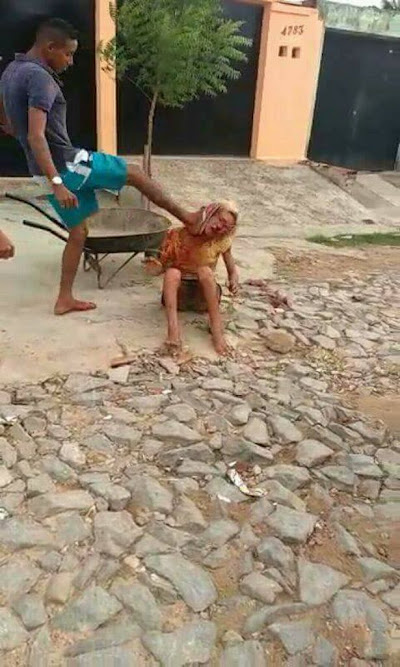Invisible War: Russia's Abusive Response to the Dagestan
In September 1999, a series of apartment bombings took place in Russia which killed over 350 people and were purportedly carried out by Chechen separatists, leading to full-scale war between Chechnya and Russia. The Second Chechen War was a bloody and brutal affair that left tens of thousands of civilians dead or missing. Human rights abuses were widely perpetrated by the Russian army and their Chechen loyalist militias led by Ramzan Kadyrov, the leader of Chechnya. Throughout the bloodshed, journalist Anna Politkovskaya reported on the atrocities from the ground, earning her the hatred of both Vladimir Putin and Kadyrov, who once told her, "You're an enemy. To be shot."
Then, on October 7, 2006, she was. Found dead in the elevator of her apartment building, Politkovskaya was said to be working on a story that called Kadyrov the "Chechen Stalin of our days" and to have evidence that Putin and Russia's Federal Security Service orchestrated the apartment bombings in order to increase his popularity and assume the presidency.
Learn more about the disturbing assassination of Anna Politkovskaya that ushered in an era of unprecedented fear in modern Russia.
The Russian apartment bombings were a series of explosions that hit four apartment blocks in the Russian cities of Buynaksk, Moscow and Volgodonsk in September 1999, killing more than 300, injuring more than 1,000, and spreading a wave of fear across the country. The bombings, together with the Invasion of Dagestan, triggered the Second Chechen War. The handling of the crisis by Vladimir Putin, who was prime minister at the time, boosted his popularity greatly and helped him attain the presidency within a few months.
The blasts hit Buynaksk on 4 September and in Moscow on 9 and 13 September. On 13 September, Russian Duma speaker Gennadiy Seleznyov made an announcement in the Duma about receiving a report that another bombing had just happened in the city of Volgodonsk. A bombing did indeed happen in Volgodonsk, but only three days later, on 16 September. Chechen militants were blamed for the bombings, but denied responsibility, along with Chechen president Aslan Maskhadov.
A suspicious device resembling those used in the bombings was found and defused in an apartment block in the Russian city of Ryazan on 22 September. On 23 September, Vladimir Putin praised the vigilance of the inhabitants of Ryazan and ordered the air bombing of Grozny, which marked the beginning of the Second Chechen War.
Three FSB agents who had planted the devices at Ryazan were arrested by the local police. The next day, FSB director Nikolay Patrushev announced that the incident in Ryazan had been an anti-terror drill and the device found there contained only sugar.
The official Russian investigation of the Buynaksk bombing was completed in 2001, while the investigation of Moscow and Volgodonsk bombings was completed in 2002. In 2000, seven people were convicted of perpetrating the Buynaksk attack. According to the court ruling on the Moscow and Volgodonsk bombings, which was announced in 2004, the attacks were organised and led by Achemez Gochiyaev, who remains at large. All bombings, the court ruled, were ordered by Islamist warlords Ibn Al-Khattab and Abu Omar al-Saif, who have been killed. Five other suspects have been killed and six have been convicted by Russian courts on terrorism-related charges.
State Duma deputy Yuri
Shchekochikhin filed two motions for a parliamentary investigation of the events, but the motions were rejected by the State Duma in March 2000. An independent public commission to investigate the bombings was chaired by Duma deputy Sergei Kovalev. The commission was rendered ineffective because of government refusal to respond to its inquiries. Two key members of the Kovalev Commission, Sergei Yushenkov and Yuri Shchekochikhin, have since died in apparent assassinations. The Commission's lawyer and investigator Mikhail Trepashkin was arrested and served four years in prison for revealing state secrets.
Former FSB agent Alexander Litvinenko, who defected and blamed the FSB for the bombings, was poisoned and killed in London in 2006. A British inquiry later determined that Litvinenko's murder was "probably" carried out with the approval of Putin and Patrushev.
The attacks were widely attributed to Chechen terrorists, despite their guilt never being conclusively proven. Some historians and journalists claim the bombings were coordinated by Russian state security services to help bring Putin into the presidency. Others disagree with such theories or argue that there is insufficient evidence to assign responsibility for the attacks. Independent investigations have faced obstruction from the Russian government
Undiluted Relationship and information bring you undiluted serial killer story, serial killers facts, murder, true crime, true crimecommunity, horror, truecrime addict, crime , tedbundy , homicide ,halloween, killer, rodneyalcala, murder on my mind, ,history ,netflixandchill ,deadlymen ,crimewatchdaily ,murderisthenewblack ,historic ,fearthyneighbor ,netflixandcrime ,crime memes ,dark ,murderer ,horrormovies ,insane ,history and many. Feel free to share and comment. Bringing you the best. Undiluted Relationship and Information





Comments
Post a Comment